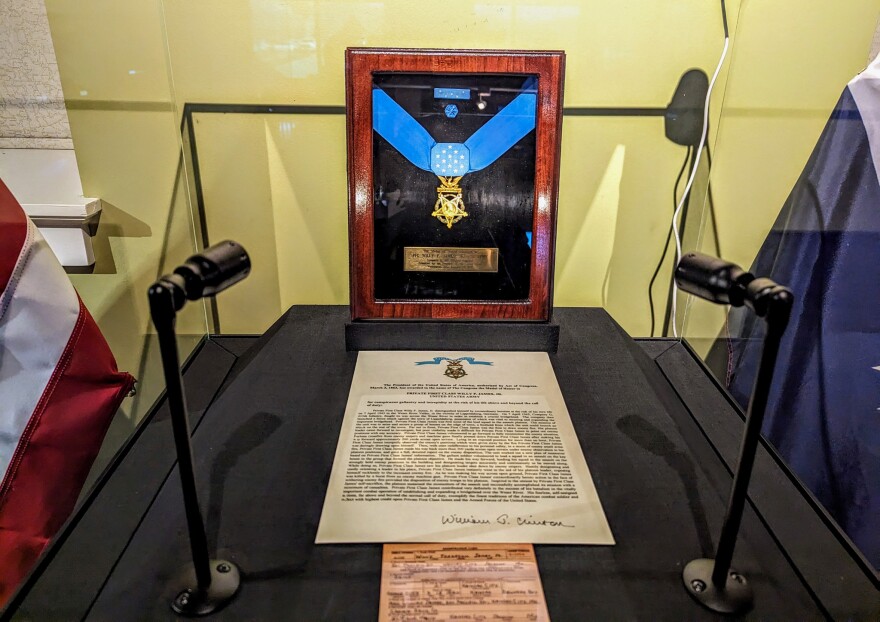On Friday, 78 years after his death in Nazi Germany, Medal of Honor winner and Army Pfc. Willy F. James Jr. was finally honored in his hometown.
In March 1945, James was one of 2,200 Black soldiers sent to the World War II frontlines. James, 25 at the time, was killed by a Nazi sniper while trying to save his injured platoon leader. He had been in combat for less than a month.
“It’s the proper burial he never received, with a firing squad and the band playing taps,” said retired Marine Robert E. Gray III at the ceremony last week. “It's only fitting he gets the proper hero’s homecoming.”
At 11 a.m. sharp, an Army firing detail from Fort Leavenworth marched single-file up the west end of the Black Veterans Memorial, at 12th Street and the Paseo. Service members and veterans stood at attention, saluting a flag as a chaplain gave a prayer. When the prayer ended, the firing detail offered one of Kansas City’s fallen African American heroes a three-volley salute.
Gray first learned James' story while reading a book about the service of Black Medal of Honor recipients. He found out that, at prior points in the war, African American service members were largely denied combat duty and relegated to the menial service of white soldiers, sailors and airmen. The military wasn’t officially desegregated until 1948.

A study commissioned by the Army in the 1990s determined James didn't initially receive recognition for his bravery because of racism and discrimination in the military. In 1997, President Bill Clinton awarded the medal to James’ family at a White House ceremony.
“I couldn’t even find a photo of him when I began this research,” Gray said.
This history of unrecognized African American valor propelled Gray for 15 years to correct James’ record.
“It's significant for us to understand our history as African American soldiers,” said Gray. “Especially those who were part of desegregating the military, and paved the way for us.”
'We are still fighting to preserve our place'
Other local African American veterans and service members commemorating James’ achievement said the city’s only Black Medal of Honor recipient had an impact on their careers, and American history.
The historic nature of the event was not lost on Lt. Gen. Milford H. Beagle, commander of the Army Combined Arms Center and the United States Army Command and General Staff College at Fort Leavenworth. Beagle is the great-grandson of a World War I veteran.
“He should have received (the medal) then, but (James) was one of seven denied because, at the time, he was deemed unworthy,” Beagle told the large crowd gathered around an exhibit about James at the Black Archives of Mid-America in Kansas City.

“Because of the color of our skin, our work was valued more as labor than it was as warriors or fighters,” he said.
Beagle said he was speaking to a part of every African American troop's experience, both past and present.
“The one underlying purpose that connects all of us of color who have worn the cloth of our nation, that one purpose was to prove that we belonged as soldiers,” said Beagle. “Private James proved his worth in a single moment and it's sad it took this long to recognize him."
Navy veteran George Pettigrew, who served during the Vietnam War and is executive vice president of the Alexander/Madison Chapter of KCMO Area National Buffalo Soldiers, said he is absolutely thrilled that Kansas City is finally honoring James. But, like all people of color he served with, he will never forget why this happened.
“The contributions that they have overlooked, shuffled aside, or erased happened because, from their point of view, we are not people,” said Pettigrew. “But history has proven we can overcome that, because we are still fighting to preserve our place in American history today.”

Gray, who spearheaded Friday’s remembrance, said he is now working with the Black Archives to elevate James’ legacy higher. He wants to have a statue of James built and placed on the Black Veterans Memorial, commemorating the service of the more than one million African American service members who participated in the fight against fascism.
“People of color need to know that we had a true American hero that lived in the segregated area of Kansas City and rose to be someone,” said Gray. “It’s long overdue for the citizens of Kansas City to recognize his sacrifice.”






